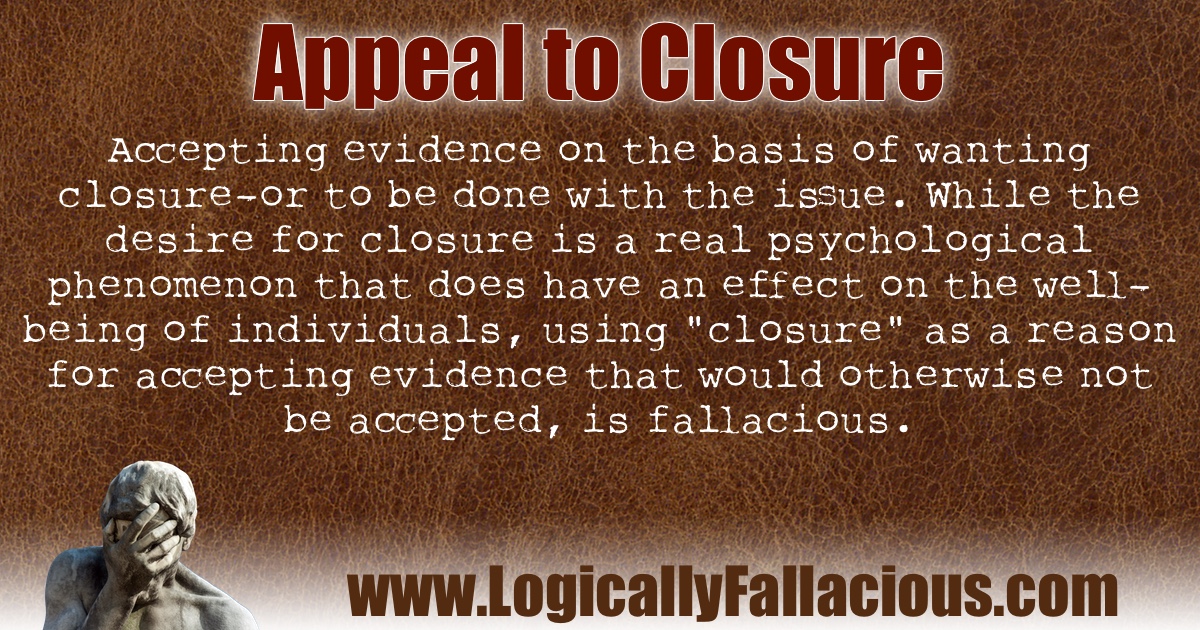(also known as: appeal to justice [form of])
Description: Accepting evidence on the basis of wanting closure—or to be done with the issue. While the desire for closure is a real psychological phenomenon that does have an effect on the well-being of individuals, using "closure" as a reason for accepting evidence that would otherwise not be accepted, is fallacious. This is similar to the argument from ignorance where one makes a claim based on the lack of information because not knowing is too psychologically uncomfortable. However, the appeal to closure focuses on accepting evidence and for the reason of closure.
Logical Form:
Evidence X is presented, and found to be insufficient (or evaluated with a heavy bias due to the desire for closure).
Closure is desired.
Therefore, evidence X is accepted.
Example #1:
After the terrorist attack on the city, the citizens were outraged and wanted justice. So they arrested a Muslim man with no alibi who looked suspicious then charged him with the crime.
Example #2:
Art: Why didn’t it work out between you and Marci?
Steve: It turns out that she was a lesbian.
Art: Did you know she and Jack just got married?
Steve: [experiences a hard hit to his ego]
Explanation: I heard from Suzi who told Tanya who told Jennifer that Marci simply thought Steve was a jerk but fed him the classic break up line, “it’s not you, it’s me.” Steve, being the alpha male he is, couldn’t deal with this psychological trauma of not having a firm answer to why Marci didn’t want to be with him, so based on the fact that Marci once commented that a supermodel had “pretty eyes,” Steve put the issue to rest by writing Marci off as a lesbian. Steve discovered that calling Marci a lesbian was actually just him projecting his own homosexual desires on Marci. Today, Steve is living happily with his partner, Raúl, and their white Persian cat, Mr. Muffins.
Explanation: Unfortunately, unsolved crimes are bad politically for those in charge and based on the number and percentage of false arrests, it is clear that appealing to closure has some serious consequences for many innocent people.
Exception: It has been stated elsewhere that "agree to disagree" falls under the appeal to closure. This is not the case because agreeing to disagree does not mean that either party is accepting the evidence of the other, in fact, it's the opposite. People can agree to "move on" or "table the issue," for many logical reasons. This is similar to negotiation and compromise. When people compromise, they usually do not agree to accept evidence they wouldn't otherwise accept. For example, if an atheist and theist are debating the existence of the Biblical God, they wouldn't say, "Okay, I'll agree that some kind of creator god exists if you agree that this god does not currently interfere in the universe."
Variation: The appeal to justice is also about closure, but “just” closure. The concept of justice is the focus where the facts and reasoning are secondary. “Do you want to live in a world where people can rob banks and get away with it? Then when it comes time for your verdict, vote Bad Boy Billy guilty!”
Tip: Remember that justice is a subjective term. When people cry “justice,” they often have created a narrative with very clear heroes and villains, when the truth is far more often unclear.

References:
This a logical fallacy frequently used on the Internet. No academic sources could be found.
Questions about this fallacy? Ask our community!